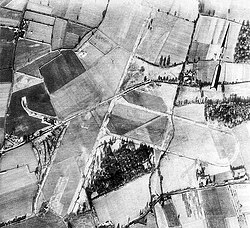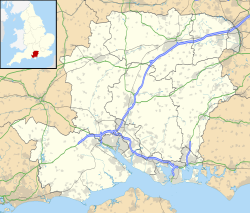Effects of the storage conditions on the stability of natural and synthetic cannabis in biological matrices for forensic toxicology analysis: An update from the literature
Contents
| RAF Winkton USAAF Station AAF-414 | |||||||||
|---|---|---|---|---|---|---|---|---|---|
| Bransgore, Hampshire in England | |||||||||
 Winkton Airfield aerial of January 1947, the airfield having closed in July 1944. The outlines of the pierced steel planking perimeter track are still evident on the land, with it being returned to agricultural use. | |||||||||
| Coordinates | 50°46′37″N 001°46′2″W / 50.77694°N 1.76722°W | ||||||||
| Type | Advanced Landing Ground | ||||||||
| Code | XT[1] | ||||||||
| Site information | |||||||||
| Owner | Air Ministry | ||||||||
| Operator | Royal Air Force United States Army Air Forces | ||||||||
| Controlled by | RAF Fighter Command * No. 11 Group RAF Ninth Air Force | ||||||||
| Site history | |||||||||
| Built | 1943/44 | ||||||||
| In use | March 1944 - January 1945 | ||||||||
| Battles/wars | European theatre of World War II Air Offensive, Europe July 1942 - May 1945 | ||||||||
| Airfield information | |||||||||
| Elevation | 12 metres (39 ft)[1] AMSL | ||||||||
| |||||||||
Royal Air Force Winkton, or more simply RAF Winkton, is a former Royal Air Force Advanced Landing Ground previously in Hampshire but now, due to County boundary changes, in Dorset, England. The airfield is located approximately 3 miles (4.8 km) north of Christchurch; and is named after the nearby hamlet of Winkton.
Although complete by September 1943 Winkton opened in March 1944 with Sommerfeld Mesh runways and pierced steel planking perimeter tracks, and was the prototype for the type of temporary Advanced Landing Ground type airfield that would be built in France after D-Day, when the need for advanced landing fields would become urgent as the Allied forces moved east across France and Germany. It was used by British and the United States Army Air Forces. It was closed in July 1944, when the mesh runways were lifted for use on the Continent, and immediately returned to agriculture.
Today the airfield is a mixture of agricultural fields with no recognizable remains.
History
USAAF use
While under USAAF control, Winkton was known as USAAF Station AAF-414 for security reasons, and by which it was referred to instead of location. Its Station-ID was "WT", Radio-Callsign "Drainsink"
404th Fighter Group
RAF Winkton saw the arrival of the USAAF 404th Fighter Group on 4 April 1944, the group arriving from Myrtle Beach AAF, South Carolina. The 404th had the following operational squadrons:
- 506th Fighter Squadron (4K)
- 507th Fighter Squadron (Y8)
- 508th Fighter Squadron (7J)
The 404th was a group of Ninth Air Force's 84th Fighter Wing, IX Tactical Air Command. It flew the Republic P-47 Thunderbolt. On 6 July the 404th moved across the Channel to its Advanced Landing Ground at Chippelle (ALG A-5), France.
Current use
With the Americans moving to France, Winkton airfield was closed down and returned to agricultural use in July 1944. In January 1945, the airfield was officially closed. Today, the land is unrecognizable as a former airfield, and can only be located by comparing the road network on aerial photographs taken when the airfield was active to the current network.
In 2009, there exists a private grass runway owned by Mr.I.C.Reid, who hangars his Tiger Moth biplane there.
See also
References
![]() This article incorporates public domain material from the Air Force Historical Research Agency
This article incorporates public domain material from the Air Force Historical Research Agency
Citations
- ^ a b Falconer 2012, p. 215.
Bibliography
- Falconer, J. (2012). RAF Airfields of World War 2. UK: Ian Allan Publishing. ISBN 978-1-85780-349-5.
- Freeman, Roger A. (1994) UK Airfields of the Ninth: Then and Now 1994. After the Battle ISBN 0-900913-80-0
- Freeman, Roger A. (1996) The Ninth Air Force in Colour: UK and the Continent-World War Two. After the Battle ISBN 1-85409-272-3
- Maurer, Maurer (1983). Air Force Combat Units Of World War II. Maxwell AFB, Alabama: Office of Air Force History. ISBN 0-89201-092-4.
External links
![]() Media related to RAF Winkton at Wikimedia Commons
Media related to RAF Winkton at Wikimedia Commons





















